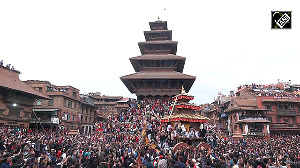Assuming the historic mantle of Egypt's first elected president, Mohammed Mursi on Monday launched moves to form a broad-based national reconciliation government, to help shake off apprehensions over his Islamist leanings and buttress his image as a moderate.
Declaring himself a leader 'for all Egyptians', Mursi who was proclaimed the winner of the first free presidential election, reached out to all those who had led the country's historic revolution, in indications that he may include his electoral rivals into his national government.
The presidential campaign had deeply polarised the country, pitting radicals, moderates and remnants of the former regime against each other, a year after the country rose in unison against the regime of Hosni Mubarak.
Mursi, 60, has his task cut out as he embarks on the process of bridging deep political divisions and negotiating the contours of the military's power, a task he began by appealing for unity in the country.
"I will treat all Egyptians the same and respect them equally," said Mursi, in his victory speech.
"I tell everybody in this memorable day that because of your choice, your will and after God's favour, I am a president for all Egyptians," the engineer-professor said on Egyptian television as tens of thousands celebrated his victory across the country.
As he replaces the 30-year iron fisted rule of Mubarak, Mursi has before him the challenge of consolidating power in the civilian administration and negotiating with the army that looks reluctant to relax its grip on power.
Mursi, who as president, retains the right to appoint the prime minister and cabinet, has already begun talks to form a presidential team and cabinet that "would truly represent Egypt after the revolution," according to a statement on the Brotherhoods' Twitter account.
At a time when the public mood is rampantly against the army that recently oversaw the dissolution of the parliament through a court order, an official of Muslim Brotherhood's Freedom and Justice Party said the president-elect would take his oath of office before parliament and not before Egypt's high constitutional court.
Saad El-Husseini, a member of the executive bureau of FJP added that the results of Egypt's presidential runoff had "served to confirm the popular desire for democracy and political change."
In a sombre victory speech on Sunday, Morsi vowed to 'protect the rights of women and children', as well as Christians and Muslims alike.
Reaching out to Egypt's activists who led last year's revolution, Mursi paid a tribute to the over 800 protesters killed in the uprising.
"I wouldn't have been here between your hands as the first elected president without... the blood, the tears and sacrifices of the martyrs," he said.
He also declared that he had a 'message of peace' and that he would respect all international agreements, in what is being seen as an indirect reference to Egypt's peace treaty with Israel.
Behind the scenes talks were already underway between the Brotherhood and generals to resolve tensions and negotiate what powers the president will have.
Shortly before the polls closed last week, the generals issued a decree sharply limiting the powers of the new president.
SCAF also holds control of legislative power, and the budget, until a new parliament is elected.







 © 2025
© 2025